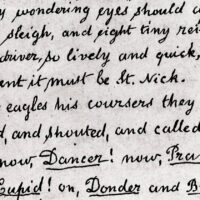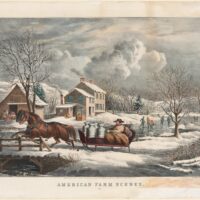Rural communities know how to pull together to make the holiday season bright, even in a year as bleak as 2020. We may miss all the holiday concerts and events that are cancelled this year, but there’s plenty to celebrate. Christmas tree growers have provided much-needed cheer to the COVID-weary and in return may see their best sales ever. Local elves help answer letters to Santa via the magical mailbox at the library. That jolly fellow made appearances as usual at pandemic-altered “reverse parades” where floats were stationary and cars drove by. There was no “scrumble” for candy along the route, but kids got a bag of treats at the end. And while it may be a bit different this year, NORAD will still track Santa’s progress on December 24.
Nevertheless, 2020 is a Grinch that hasn’t stopped trying to steal Christmas. So here are a few tips on how to stop the pandemic plunder of your holiday cheer when you have a rural “last mile” address.
‘Tis A Gift To Be Simple
I was in tears during the Dolly Parton Christmas special when she sang Coat of Many Colors. Okay, that one always makes me misty. But as she talked about her parents between songs I was thinking back to a Christmas on the farm. My parents struggled to make ends meet, and my sister and I knew that the Sears Christmas Wish Book was just for wishing. But one year my mom transformed a couple yards of blue tulle and some ribbon into the most beautiful ballerina skirt there ever was. Going on 60 years later, that’s still a favorite holiday memory. And I treasure memories of opening gifts wrapped in newspaper and duct tape to find things my dad made in his woodshop. One year Dad gave Mom a fuel filter for the tractor and she said, “Just what I wanted.” The holiday memories you make for your loved ones in 2020 may be very different from what you envisioned pre-pandemic. That’s not the worst thing to come out of this year.
A Bird in The Hand
Even if you don’t go full Ma-and-Pa Ingalls, you might want to temper your expectations about what constitutes a perfect holiday gift. It’s not unusual for there to be a shortage of the hot toy or gaming system in a normal year. And in a normal year you might relish the thrill of the shopping hunt for those items. This year, though, COVID-related supply chain disruptions can be felt in everything from jigsaw puzzles to bicycles. Manufacturers had shut-downs because of the virus or couldn’t get materials or parts because of other disruptions along the supply chain. It’s unlikely that pallets of those items will appear just in time for last-minute shoppers.
Order Now
You may have stuff stacked up in virtual shopping carts parked in half a dozen virtual stores. If you’re waiting for a better price closer to the holiday, don’t bet on it. If you’re hoping to find something else that will be a grander expression of your love and gifting genius, see above. Because whatever you finally settle on, your chances of it arriving on time are dwindling fast. The incredible volume of packages in transit is pushing carriers’ capacity to the limit. In fact, earlier this season UPS put temporary limits on package pick-ups from some large retailers.
Ship Now
You may still have packages to ship because you won’t be traveling over the river and through the woods during a pandemic. Forget the fancy wrappings or baking one more batch of cookies to tuck in with gifts and just get those packages sent asap. The US Postal Service’s recommended ship-by dates for the 2020 holiday season may have been optimistic. A friend at the Post Office told my husband we should try to ship by December 12 instead of December 15. Some of our Priority Mail packages have been taking five days or longer, which is frustrating but makes sense: People who work in distribution centers and sorting facilities and people who drive the trucks that move packages are not immune from COVID-19. There will be delays when facilities must be closed for deep cleaning and the people who work in them are sick or quarantined because of exposure to the virus.
Track Your Packages
Sadly, the Grinch has minions now. They’re called Porch Pirates, and they hit rural areas too. Many of us reduce temptation by asking carriers to leave packages in less visible places. Still, I don’t want to test my consumer protections for purchases marked delivered but not received, since I haven’t actually signed for a package in, oh, years. In my Etsy shop I advise buyers to track their packages.
Unfortunately, the Grinch also has minions who pfish: They send text alerts or emails that say, “Click here for updates on a package delivery.” Since we’re all waiting on packages, it’s an easy scam to fall for. Clicking links in pop-ups, texts or emails may expose your devices to malware, so don’t do it. A valid notification generally will give some information about the movement of a package. If that’s not enough, go to the vendor or carrier site or your order confirmation message for a clickable link.
The Big Picture
Slow or delayed shipping timesmay be inconvenient during the holidays, but let’s not forget: Package carriers are carrying more than your gifts. Because of the pandemic, we are relying on delivery of more items than ever — everything from medications to pantry items. Rural mail carriers are working extra hours beyond the old “normal” fixed pay rates based on annual audits of delivery volume and time to complete a route. In June, the National Rural Letter Carriers Association filed a national-level grievance asking the Postal Service to consider the pandemic a “peak season” that would allow rural carriers to receive overtime pay. Since then, carriers have seen volume increased even more from political flyers and absentee ballots. For those of us who live on rural postal routes, especially hired contract routes, there isn’t a deep bench of reserve carriers to cover for workers who are ill, in quarantine, or caring for ill family members. So let’s try to help Santa’s helpers by shoveling snow promptly around the mailbox, going out to meet the mail carrier delivering packages, and leaving a porch light on for the UPS and FedEx drivers working late.
Donna Kallner writes from rural northern Wisconsin, where a long line at the post office might be three people.





